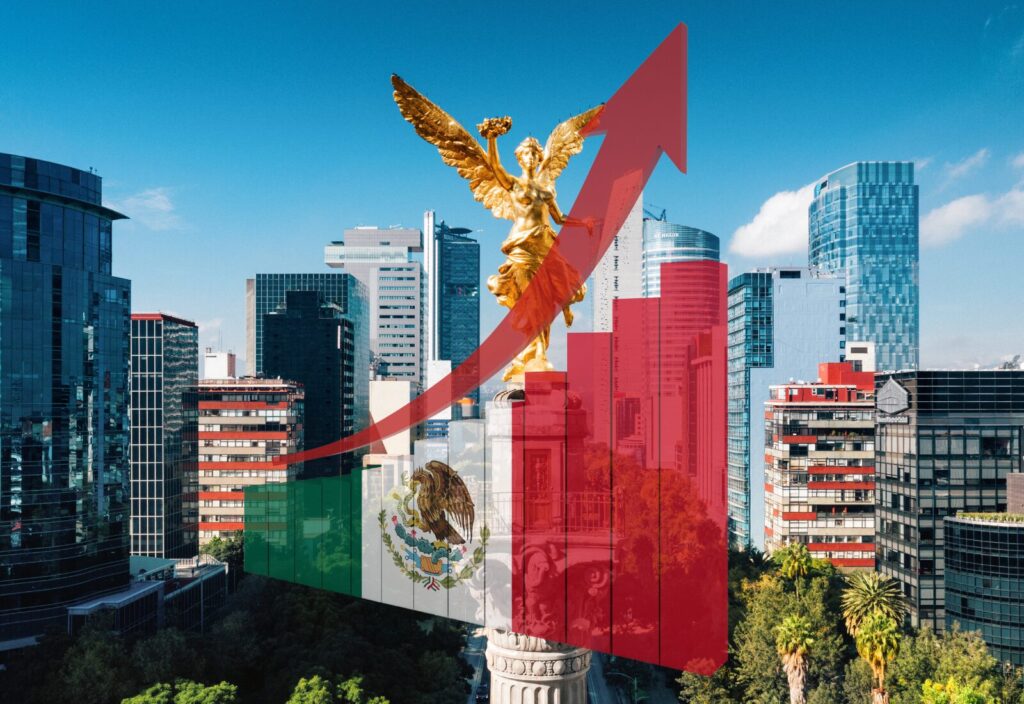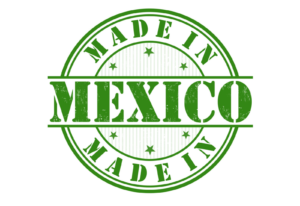Forming a Company in Mexico
Mexico’s economy is booming, driven by a young and tech-savvy population, its strategic location next to the US, favorable trade deals with North America and the EU, and a government eager to attract foreign investment.
This surge has attracted a wave of companies from various industries, all eager to tap into Mexico’s dynamic market.
Who’s Setting Up Operations in Mexico?
Manufacturing Companies: Mexico’s well-established manufacturing sector, competitive production costs, and participation in trade agreements like USMCA (also known as NAFTA 2.0) continue to be a magnet for automotive, aerospace, clothing, and electronics companies. Mexico’s proximity to the U.S. supply chain offers a significant advantage. Not surprisingly, our law firm is getting a ton of queries from American and Canadian companies seeking assistance with going into Mexico to manufacture products for shipment and sale to the United States, but many Chinese, Indian and European companies are also interested.
Tech Companies: Guadalajara, dubbed Mexico’s Silicon Valley, is witnessing a boom in tech startups and established technology giants like IBM and HP setting up shop. This is driven by the availability of skilled software and hardware engineers, and a growing domestic market for tech products and services. In addition to Guadalajara, we are seeing interest in Mexico City, Monterrey, Querétaro, and Puebla.
Consumer Goods Companies: Rising disposable incomes and a growing middle class are fueling a growing demand in Mexico for high-end consumer goods. Companies offering everything from designer clothing and furniture to specialty food items are finding a receptive audience in Mexico.
Fintech Companies: Mexico’s large unbanked population and increasing smartphone penetration present a vast opportunity for fintech companies.
Renewable Energy Revolutionaries: Mexico is actively seeking to diversify its energy portfolio, creating opportunities for companies specializing in solar, wind, and geothermal power. Government incentives and an increasing focus on sustainability are driving this trend.
Mexico As a Compelling Proposition
The factors attracting these diverse businesses to Mexico include the following:
- Cost-Competitive Advantage: Mexico offers lower labor costs, compared not just to countries like the United States, but also to China, making it an attractive option for manufacturing and production facilities.
- Strategic Location: Mexico’s border with the U.S. facilitates trade and logistics, while also providing access to a wider North American market. Mexico also shares time zones with the United States, and all of Mexico’s principal business centers can be reached in a few hours from the U.S.
- Trade Agreements: Mexico’s membership in trade agreements like USMCA reduces trade barriers, customs duties and tariffs, making Mexican exports more competitive.
- Skilled Workforce: Mexico boasts a large pool of skilled and educated labor, particularly in engineering and technology fields.
- Growing Domestic Market: Mexico’s burgeoning middle class with rising disposable income presents a promising consumer base.
- Government Incentives: The Mexican government actively encourages foreign investment by offering tax breaks, streamlined regulations, and infrastructure development projects in certain sectors.
Planning and Preparation: A Solid Foundation Before Company Launch
The below are some key considerations that will lay the groundwork for your successful Mexican venture:
Business Structure: It is critical that you select the Mexican legal entity that best aligns with your business goals and your ownership structure. The below is a very brief breakdown of the most common options in Mexico:
- Sociedad Anónima (S.A.): Similar to a corporation in the United States. These are the most commonly used entities and also the most regulated by Mexican legislation. While they can issue shares, they are not publicly traded. Shareholders’ liability is limited to their investment, offering protection for personal assets. A minimum of two shareholders are required.
- Sociedad Anónima Promotora de Inversión (S.A.P.I.): These entities provide substantial flexibility to promote investment because they are entitled to issue different classes of shares, which may increase or limit corporate rights. They are regulated by the Mexican Securities Market Law and their formation is intended to be a preliminary step before a listing. As with the S.A., shareholders’ liability is limited to their investment and a minimum of two shareholders are required.
- Sociedad de Responsabilidad Limitada (S. de R.L.): Similar to a limited liability company (LLC) in the United States, these entities are limited to a maximum of 50 partners (socios).
- Sociedad por Acciones Simplificada (Simplified Joint Stock Company): This is the simplest Mexico entity structure and can be incorporated online. This kind of company is only for small businesses, with income not exceeding MXN 7 million (an amount that is adjusted every year), and shareholders can only be natural persons.
Variable capital: All the entities mentioned above may choose to have variable capital (capital variable or C.V.), which can be gradually increased over time.
Foreign Investment Regulations: Foreign ownership is possible in most industries, but some activities are restricted or require previous authorization. In addition, all companies with foreign investment must be registered in the National Registry of Foreign Investments (RNIE).
From Concept to Mexican Corporation: A Step-by-Step Guide
The following are the basic steps it is typically necessary to take to form a company ready to operate in Mexico:
1. Company Name Approval: Obtain approval for your desired company name from the Secretariat of Economy (SE). In parallel, conduct a trademark search to ensure the name or part of it is not already registered as a trademark.
2. Develop the Bylaws: This document outlines the company’s structure, purpose, administration, and regulations. It will specify details like the type of corporate entity, capital contributions of each shareholder, profit-sharing arrangements, and the powers of the board of directors. A notary public will be required to authenticate the document issuing a deed.
3. Register with Public Registry of Commerce (RPC): Officially register your company with the RPC by presenting the notarial deed mentioned above, making it a legal entity and granting it the ability to conduct business in Mexico.
4. Obtain Tax Number (RFC): Register with the Mexican tax authority (SAT) to acquire the company’s Mexican tax ID (Registro Federal de Contribuyentes or RFC). This is essential for tax compliance, invoicing, procedures with all the authorities and even to open a bank account. The process must be done directly in the SAT’s offices and can be done only by a Mexican or a foreigner with legal residency, with their own RFC.
5. Secure a Fiscal Address: Establish a legal address for your company in Mexico. This is the physical location of your operations. Having a registered fiscal address is mandatory for tax purposes and receiving official notifications.
6. Open a Bank Account: Select a reputable Mexican bank that caters to businesses. You will need your RFC and other company documents to open the account. Deposit any required minimum capital to activate the account, as stipulated by your chosen business structure.
7. RNIE Registration: As mentioned above, all the companies that have foreign investment must be registered in the RNIE.
8. Additional Registrations: Depending on your industry, you might need to register with specific entities for additional permits and licenses. This could include the Secretariat of Labor and Social Welfare (STPS) for labor regulations, the Mexican Institute of Social Security Institute (IMSS) for employee social security, and specific ministries depending on your activity (e.g., the Secretariat of Health for food production).
The Time it Takes to Form a Mexican Company
Incorporating a company in Mexico typically takes 4-12 weeks. The need to authenticate (apostille) and translate documents can add to the timeframe.
Other factors that impact time and costs can vary depending on factors like company structure, legal fees, notary services, location, and any additional permits required. Some cities definitely take longer than others and when time is of the essence you might want to consider having your company formed in one city and then moving its corporate location to another city at a later date. Once again, legal advice from those on the ground is essential to successfully incorporate a company in Mexico.
Beyond Incorporation: Building a Sustainable Mexico Business
Once you have your Mexican company formed, the following come into play for most companies:
Comply with Ongoing Tax Obligations: Familiarize yourself with Mexican tax laws and filing requirements. Partner with a local accountant to ensure timely and accurate tax filings.
Obtain Business Permits and Licenses: Depending on your industry, you might need additional permits to operate legally. A business lawyer can help identify any necessary licenses and guide you through the application process.
Hire and Manage Employees: Understand Mexican labor laws and employee benefits regulations. Partner with a human resource professional to ensure you are compliant with all employment regulations.
Protect Your Intellectual Property: Secure trademarks, patents, and copyrights to safeguard your brand and innovations.
¡Vamos!
With careful planning and strategic execution, you can be well on your way to succeeding in the Mexican market and contributing to Mexico’s vibrant economic landscape.
This blog post was co-written by Fred Rocafort of Harris Sliwoski and Rafael Chávez Molinos, a partner-level attorney with Harris Sliwoski’s affiliated law firm in Mexico, Rivadeneyra, Treviño & De Campo, S.C. Fred and Rafael have worked on many Mexico company formation and structuring matters.





















